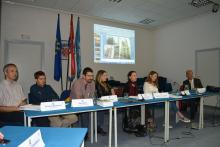Transition towards post-carbon cities
The tribune and panel discussion on the low-carbon development was held in Zagreb, Croatia.
For the first time in human history, monthly concentrations of carbon in the atmosphere reached concentrations above 400 parts per million (ppm) in April, which resulted in a temperature increase of 0.8°C with a projected additional increase between 3.7 and 4.8°C by the end of the century. It is not only about temperatures. High carbon concentrations cause a whole range of changes in nature and impacts, which we already feel today and will feel even more in the not so distant future. The future is 2030-2050- the generation of our children. The climate change impacts today mean more frequent and stronger weather extremes, heat-waves or warm winters with no snow – like the recent one in Europe, or frost as never seen before - like the recent one in North America. This also includes floods like the current one in Sava river basin that severely affected Bosnia and Herzegovina, Croatia and Serbia. How will life in cities look like in this changing context and what we can do as an individual about it?
The safe level of carbon dioxide in the atmosphere is 350 parts per million (ppm), but the only way to get there is to immediately transition the global economy away from fossil fuels and into renewable energy, energy efficiency and sustainable practices in all sectors (agriculture, transport, manufacturing, etc.). The scientific community agrees we should immediately do something about it and reduce carbon emissions. Policy-makers agree we should do something, but they cannot agree who should do what, how much, by when and who should pay for it? This is called global climate negotiations. The most advanced policy-makers are proposing low-emission development strategies and green development packages or 2050 roadmaps towards low-carbon economies like those in the EU. They are all proposing that by 2050 there should be a reduction in carbon emissions by 80-95%, which means reduction in consuming fossil fuels but still encourage boosting the economy and development, feeding the population and ensuring normal life. What can a city like Zagreb do about it? How will life in Zagreb look when our children reach 21? This was the topic of the event which was organized as an introductory workshop within European project POCACITO (Post-Carbon Cities of Tomorrow) during Zagreb Energy Week.
The aim of the tribune was to point out different initiatives and ways in which individuals can contribute to the reduction of carbon emissions and the realization of the vision of post-carbon cities through discussions with participants from various fields (sociologists, urban planners, energy experts etc.). Low-carbon development, which refers to the process of reducing greenhouse gas emissions that will create positive effects on society, economy and the environment, requires fundamental social and economic changes over a long period of time. Local farming, alternative forms of public transportation such as bicycles, building with natural materials and a better use of public spaces are just some of the ways in which we can contribute to the reduction of the greenhouse gas emissions.
Participants of the panel discussion agreed that a successful transition to low-carbon development isn't possible without local production, spending cuts and community solidarity. In fact, as a community starts to be able to assure the attainment of its own goods, it will be less dependant on fossil fuels and will limit the impact of climate change. Videos of the panel discussions (in Croatian) can be found online.
The guidelines and an d evidence‐based 2050 roadmap for the post-carbon city of Zagreb will be developed within project POCACITO (Post-Carbon Cities of Tomorrow), which started this year and will last for the next 3 years.
Early signs of transition towards the post-carbon city of Zagreb are encouraging. However, actions solely from individuals and civil organizations who were presented at the event will not be enough to enable the whole transition towards low carbon society. Such a transition requires the actions of many.
- Zoran Kordic, UNDP Croatia

